Business
The real costs of closing the economy and the need for two approaches
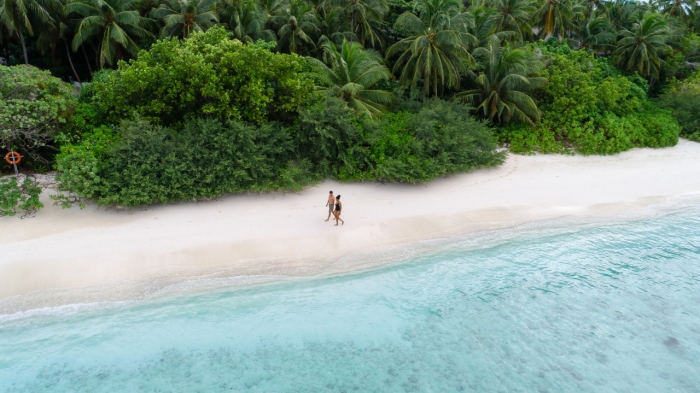
By Sonu Shivdasani
Thank you for all your replies to the opinion article I shared a few weeks ago, ‘How Maldivian Tourism can Survive Covid-19’. I appreciate all the messages of support. However, I realise that some readers misconstrued the points I was making and judged the piece as elitist. Whilst the top 30 resorts in the country by average rate account for a majority of the country’s tourism revenues; this was not my intention at all.
I do not believe the government should only allow wealthy tourists with private jets to visit the Maldives. My point is that permitting smaller planes to land in regional airports is the easiest way to begin the process of reopening the tourism economy whilst still keeping Male safe from any risk of contagion.
That op-ed was also driven by the following considerations:
- About 90 per cent of the economic activity in the Maldives is driven by the tourism industry, all of which takes place on islands completely separated from Male.
- There are two aspects to the Maldives that are relevant to this debate; Male, the capital of the country is one of the most densely populated places on the planet and thus at risk should the capital become infected. However, the rest of the Maldives is naturally isolated into more than 1,100 separate islands and this is where the tourism wealth is generated.
- The loss and damage to the economy is not linear, but exponential – the costs of closing resorts grow at an ever-increasing pace (more about this later).
- Various countries are at different stages of the Covid-19 bell curve. China has gone through the curve and largely recovered. South Korea is getting there. At present, these are the only two big markets that are largely Covid-19 free. The traditional European markets are at least 60 days behind China and South Korea.
- Given how important tourism is to the economy, the Maldives cannot wait until all its major markets are Covid-19 free before reopening the border. The government must begin figuring out how to reopen to countries that have overcome the virus.
- That said, the entire Maldivian tourism industry will not survive on Chinese and Korean guests alone. The Maldives will, at some point in the not-too-distant future, need to open up to other markets, which is why we need to work out how to do it in a manner that is safe and does not put the country at risk.
- Hence my suggestion to start welcoming smaller planes, such as private jets, and small commercial aircraft such as A320s and 737s that hold around 120 passengers. Limited numbers of passengers can be more easily tested for Covid-19 upon arrival, compared to hundreds and hundreds of people disembarking big planes like 777s. Qatar and Etihad Airways, which both serve the Maldives, have an extensive fleet of smaller planes. The regional airports in the Maldives can also accommodate these smaller aircraft. Using regional airports would avoid any risk of contagion in Male, which is surely paramount given its population density.
The importance of tourism and the urgent need to revive it
As I mentioned above, about 90 per cent of the Maldivian economy is dependent on tourism. According to the World Bank, in 1980 the Maldives was amongst the poorest 20 countries in the world. Today, after 40 years of tourism, the Maldives is a middle-income country with the highest per capita GDP in South Asia where the life expectancy and literacy rates are 74 years and 76 per cent respectively. Tourism has made the Maldives prosperous. Tourism is the lifeblood of the Maldivian economy, but it is imperilled by the Covid-19 shutdown.
Moreover, the damage the shut-down is doing to the industry is not linear, but exponential. At the moment, most resorts have closed, and many have slashed costs, including wages — but resorts are not, yet, going bankrupt.
This is because resort companies usually have enough resources, cash in the bank, and goodwill with their creditors to absorb a major shock, as long as the crisis doesn’t last too long. Resorts with very healthy bank accounts might even be able to survive a few months without any tourists.
However, as the weeks and months pass with the border still shut, things start to get ugly. Resort companies run out of cash, their investors lose confidence and refuse to extend new lines of credit, and firms eventually go out of business. A bankrupt resort cannot pay its outstanding bills, which in turn threatens to bankrupt its suppliers. Each resort that goes under also lays off hundreds of staff, who then don’t have money to spend in shops, restaurants, and cafes, which in turn suffer. As this scenario plays out in dozens of resorts and companies up and down the country, before long you end up with an economic meltdown.
To prevent such a crash from taking place, it is vital that the border is reopened as soon as possible.
The government has handled the Covid-19 crisis incredibly well so far. Even as authorities grapple with the recent spike of cases in Male, closing the borders until there is a Covid-19 cure, or the whole world has eradicated the virus (which could take a year or two), is not a viable option for the Maldives because it would kill the tourism industry, and push tens of thousands of people into poverty. It is important for the government to find pragmatic ways to reopen, without placing the country at unnecessary risk of a coronavirus outbreak.
In fact, if the Maldives reopens and engages in bilateral discussions with certain key markets soon, it can expect a bumper summer. Asia Pacific is the largest regional travel market. In fact, Chinese travel accounts for greater than 20 per cent of global travel at US$ 270 billion. Traditionally the Chinese, the Indians, the Russians and those in the Middle East head to Europe and North America for the summer. At present, these summer holiday markets, remain shut. With few destinations to choose from, tourists will likely flock to the Maldives. We will even see strong demand coming from Europeans. Europeans are fed up of the lockdown and would like to escape. They are concerned about traveling to other destinations in Europe where Covid-19 still exists. There are attracted by the one island, one resort aspect of the Maldives that renders the islands stronger fortresses against Covid-19.
At Soneva, booking inquiries suggest July and August 2020 could even be better than summer 2019. We are receiving significant numbers of booking requests, and guests are asking for longer stays – often up to a month.
However, the governments of these key potential markets to the Maldives have currently closed their borders for international travel. It will require a proactive approach and extensive government to government discussions in order to reopen travel. It will not be easy. We need to start now, and establish standards of hygiene, testing protocols and other criteria that will be acceptable to foreign governments.
Testing, testing, and testing
The irony with Covid-19 is that because it is much less virulent than other past viruses, it has managed to wreak more damage than past epidemics and bring the world to a halt. Because it is so mild, it has become much more contagious as people that are infected with the virus show no symptoms at all. Apart from devising better ways to treat people who are infected, the main approach to overcoming the virus is to test extensively.
There are many Covid-19 tests available that use decades old technology called reverse transcription polymerase chain reaction (RT-PCR). These tests can yield accurate results in the earliest days of a Covid-19 infection. The Foundation for Innovative New Diagnostics (FIND) headquartered in Geneva, Switzerland is evaluating 300 such tests. Their first evaluations have shown that some of these tests are 99 per cent accurate. The test units themselves are cheap. However, a machine and hospital technician is required to establish the results of the test. In South Korea, results are available in as little as 12 hours. Cheap and accurate, good quality PCR tests are available today.
Scientists are also developing tests based on immunoassays. Immunoassays offer an alternative to PCR tests. One immunoassay, an antigen-based test, detects the presence of protein structures, called spikes that are unique to the virus. Antigen-based tests require no specialised personnel or large instruments. They are relatively inexpensive and like a pregnancy test, can deliver results in minutes. It is my understanding that certification and production of these tests are still a few months away. In the interim, PCR-based tests are a good stop gap solution.
The need for two separate approaches
National prosperity and wellbeing are dependent upon the government taking two separate approaches: reopening borders to tourism in the islands and atolls where there are few coronavirus cases; and strictly protecting Male from community spread. Because of the capital’s population density, the virus can spread rapidly in the city, so it must be given extra protection.
However, many Maldivians are now without either jobs or pay. The government has announced support for people who have lost their jobs. This is an important and worthy measure of support. But because the Maldivian economy is so dependent on foreign tourism, it will not stimulate the economy much in of itself.
The US government is paying furloughed employees 100 per cent of their lost salary; in the UK it is 80 per cent of lost salary. This is easy to do for the United States and Britain because they can print US dollars and Sterling Pounds, and not suffer from a currency devaluation. Unfortunately, the Maldives government may not have such flexibility because of the relative size of the economy. So, the principal way that the government can support the people is to encourage the reemployment of Maldivians, so they can pay their bills and meet their financial commitments.
The real drivers of wealth in the Maldives are the resorts, which attract millions of tourists, who spend lots of hard currency. To stimulate the economy, one needs to allow, and attract tourists back to the Maldives. Reopening the borders in a safe manner, with testing on arrival, is the best way. There is a clear separation between the islands that generate the tourisms dollars, and Male. So, rebuilding the tourism economy and protecting Male are not mutually exclusive.
The government should be praised for its handling of the Covid-19 crisis thus far. Let us hope they can reopen the border shortly, before the shutdown causes irreversible damage to the industry that is the lifeblood of the economy, and the prosperity of the people.
Editor’s Note: This op-ed was originally published on Linkedin by Sonu Shivdasani. Sonu is the founder and CEO of Soneva, which owns luxury resorts Soneva Fushi and Soneva Jani in the Maldives, and Soneva Kiri in Thailand.
Action
Ataraxis Grand & Spa hosts integrated work-and-dive corporate retreat in Fuvahmulah
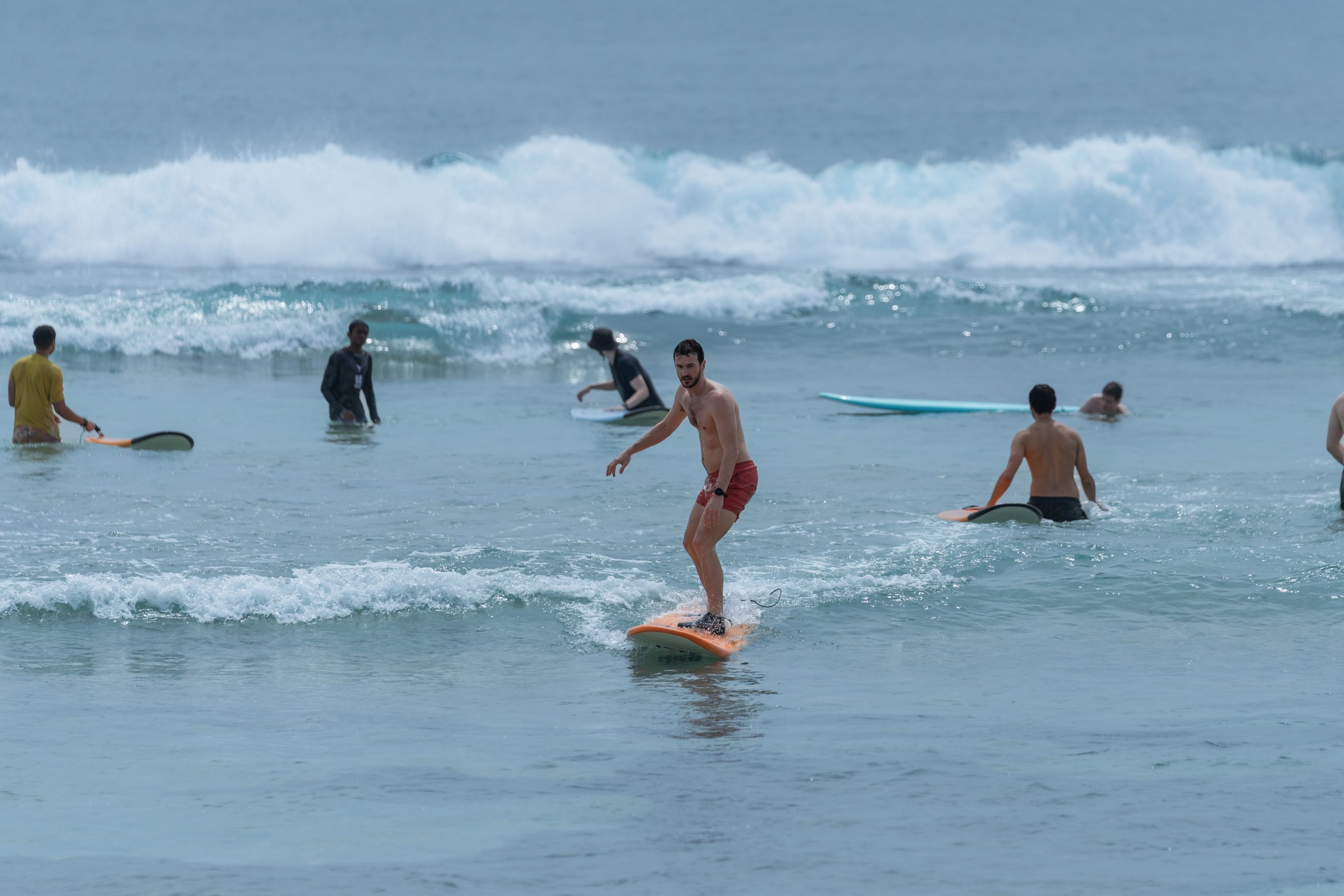
Ataraxis Grand & Spa recently hosted a week-long, closed corporate offsite in Fuvahmulah for a US-based artificial intelligence company, highlighting the island’s growing suitability for integrated work-and-experience retreats. The retreat brought a group of 36 international professionals to the property, which was reserved exclusively for the programme.
Designed as a private company offsite, the stay combined structured daily work sessions with guided diving and beginner-friendly surf experiences, creating a balanced format that blended focused collaboration with physical reset.
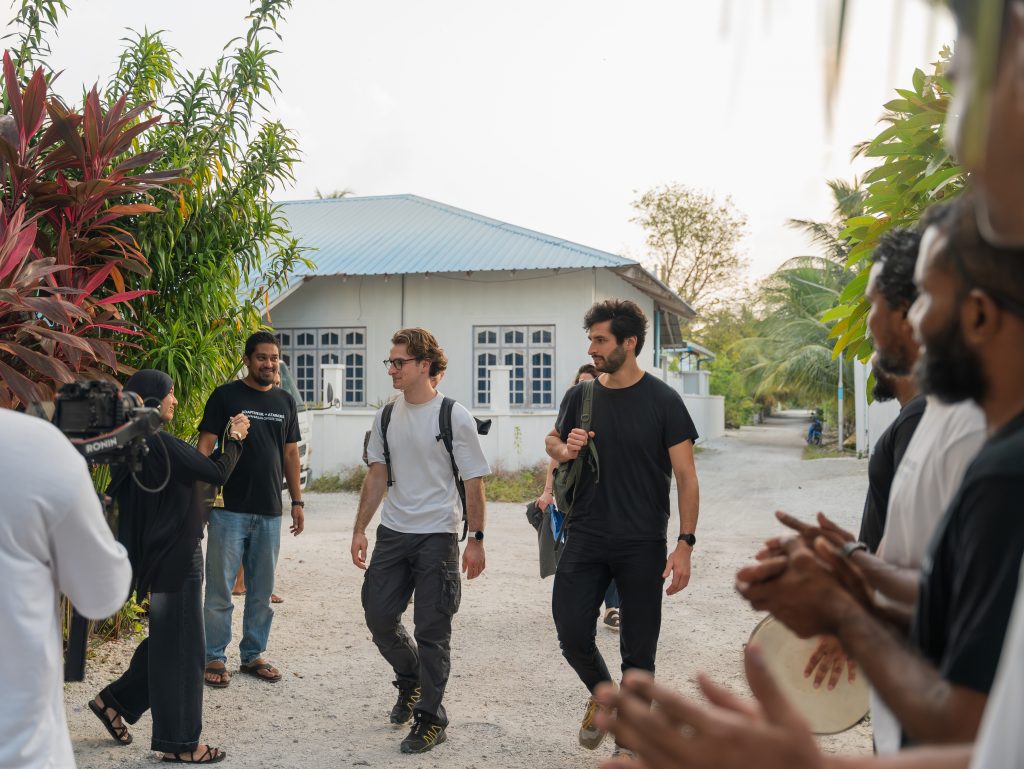
A notable component of the programme was dive training and certification. During the retreat, 17 participants completed their Open Water certification, while a further six undertook the Advanced Open Water course, with training and dives scheduled alongside work sessions as part of the integrated itinerary.
Throughout the week, participants worked on-site using dedicated shared spaces supported by reliable high-speed internet, allowing meetings, informal collaboration and scheduled activities to take place within a single, uninterrupted environment. This setup enabled teams to move seamlessly between work periods and organised ocean activities without leaving the property.
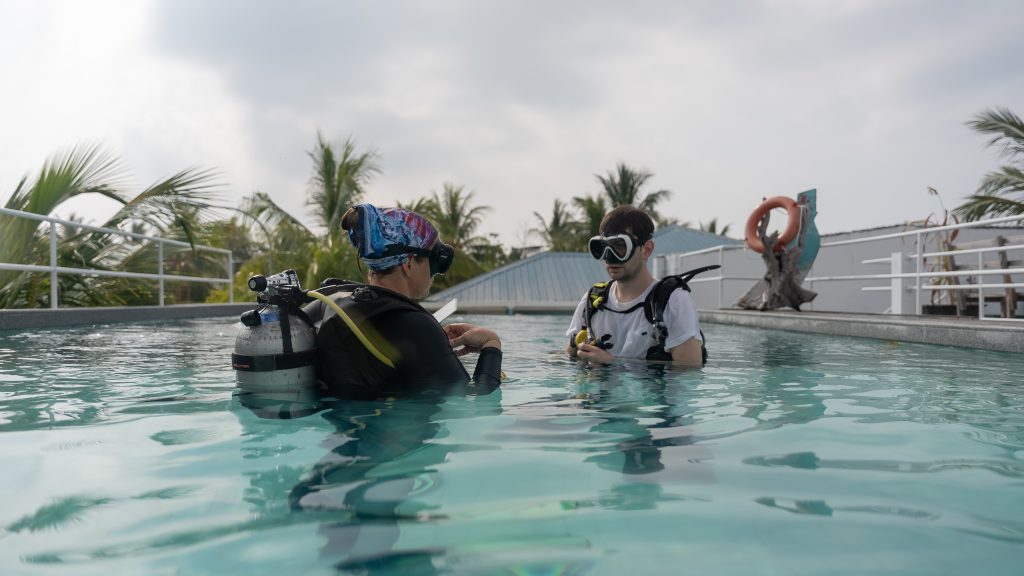
Fuvahmulah’s natural and operational advantages formed a key part of the retreat’s appeal. As one of the Maldives’ largest inhabited islands, it offers immediate access to pelagic dive sites, internationally recognised shark diving and surf breaks suitable for instruction, alongside the infrastructure required to support extended group stays.
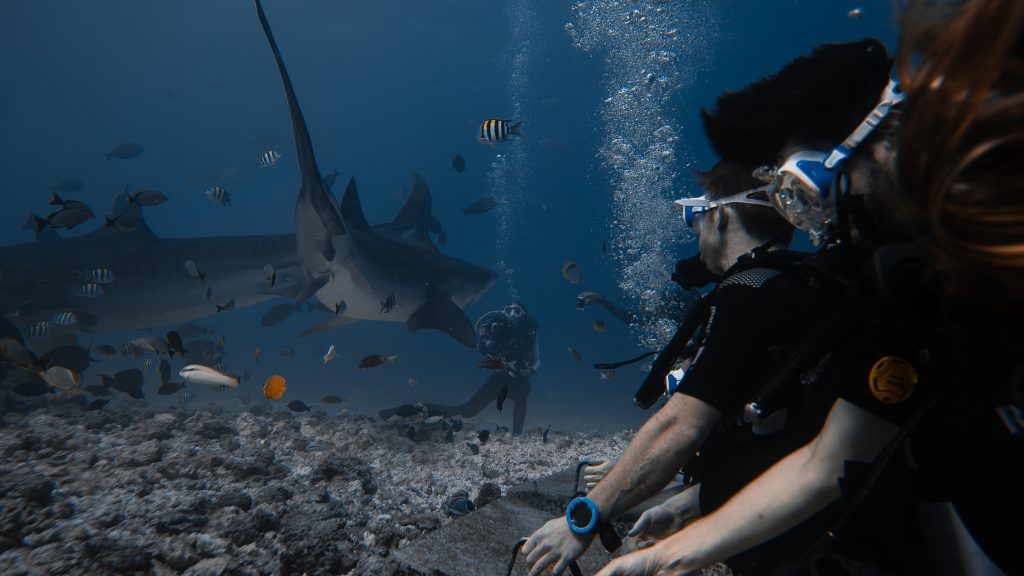
The offsite reflects a growing preference among technology and knowledge-sector teams for small-scale retreats that prioritise concentrated work environments and team cohesion over traditional conference formats. Such programmes typically involve longer stays and higher per-capita spend, aligning with sustainable, quality-driven tourism models.
The retreat also demonstrates how locally operated properties such as Ataraxis Grand & Spa are supporting this shift by delivering unified environments where accommodation, workspaces, connectivity and curated experiences operate as a single programme rather than separate services.
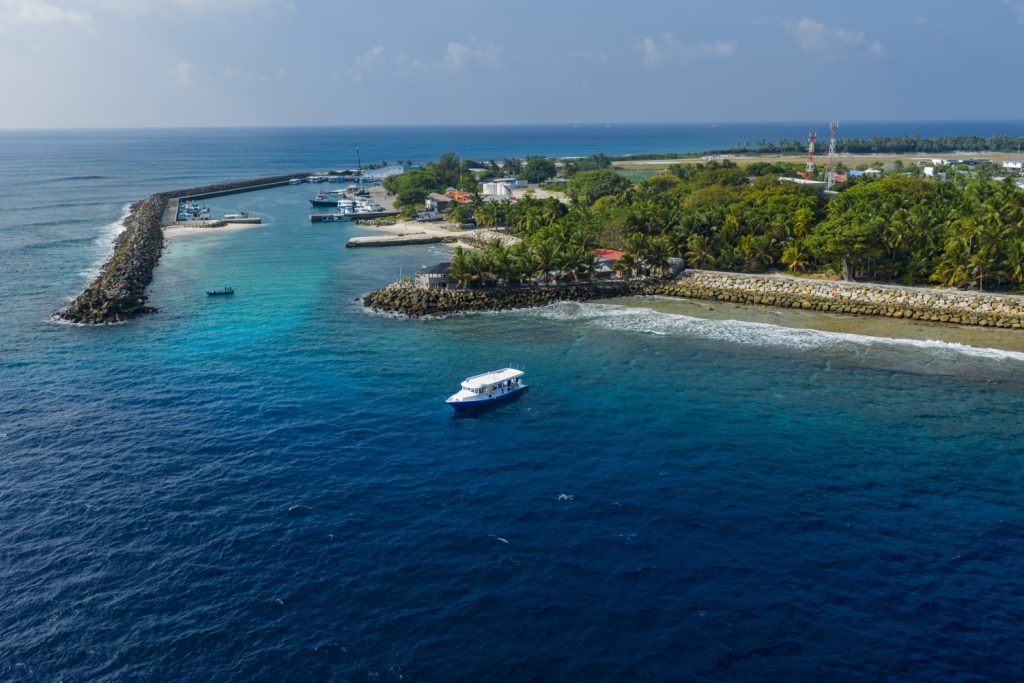
As organisations continue to explore alternative formats for strategy sessions, team resets and creative offsites, Ataraxis Grand & Spa’s experience positions Fuvahmulah as an increasingly viable destination for integrated corporate retreats.
Ataraxis Grand & Spa offers work-and-dive retreat programmes in Fuvahmulah that combine accommodation, dedicated workspaces, high-speed connectivity and organised diving and surfing.
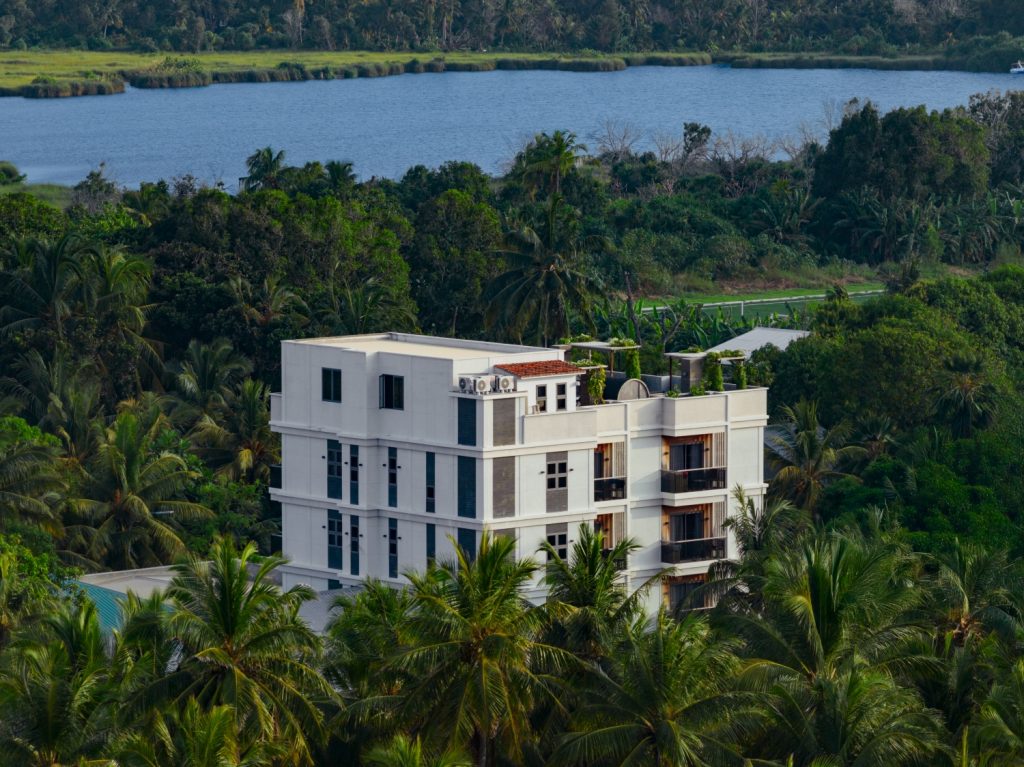
Further information on retreat formats and dive-inclusive stays is available via the Ataraxis Grand & Spa website.
Business
Bestbuy Maldives, Atmosphere Core elevate chef training with Michelin-star masterclass
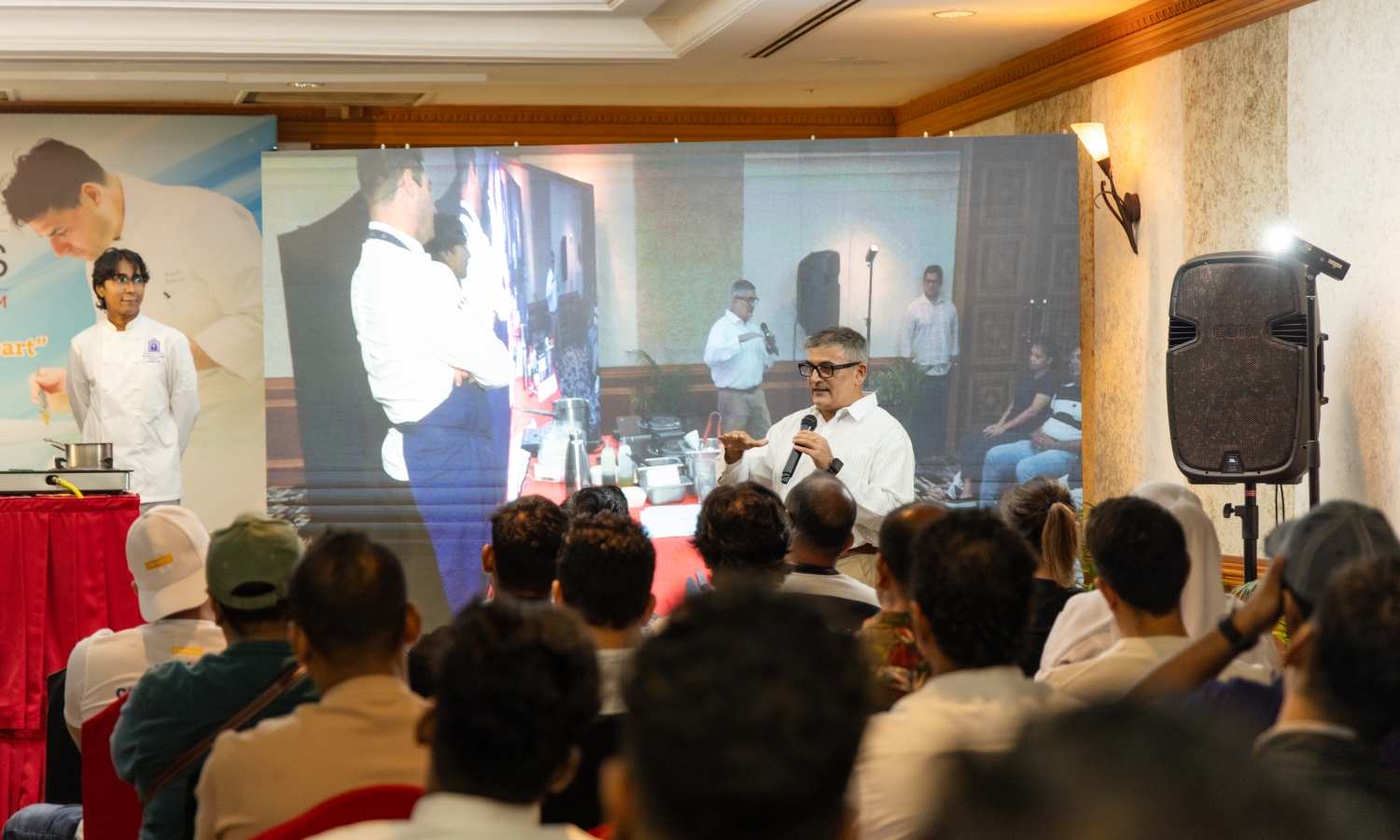
Bestbuy Maldives (BBM) brought together 100 chefs from leading resorts and restaurants across the country on 24 November for an exclusive culinary masterclass led by Italian One-Michelin-Star Chef Pasquale Palamaro. Held at Hulhule Island Hotel (HIH), the full-house session marked a key highlight of the ongoing “Mediterranean Soul, Maldivian Heart” culinary series presented by Atmosphere Hotels & Resorts in collaboration with BBM.
The masterclass formed the Malé City chapter of the broader programme, which features a lineup of events hosted at RAAYA by Atmosphere and VARU by Atmosphere throughout November 2025. The HIH masterclass served as a platform for professional development, skill exchange, and hands-on learning for chefs from some of the Maldives’ most distinguished culinary teams.
Chef Pasquale, celebrated for his work at Indaco Restaurant in Amalfi, guided participating chefs through a series of live demonstrations that reflected his signature philosophy—one that emphasises intuition, simplicity, and a deep respect for natural ingredients.
“Cooking, to me, is a dialogue with nature — an art of transforming simplicity into beauty. Bringing Indaco’s spirit to the Maldives is an opportunity to merge two coasts and two cultures through taste, technique, and emotion,” he shared during the programme.
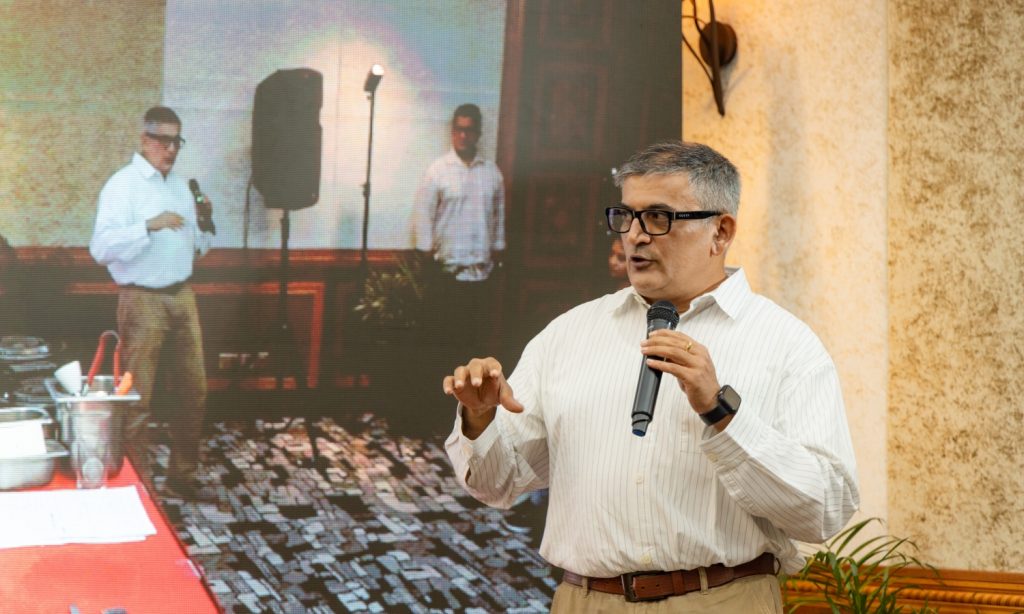
Participants explored Mediterranean-inspired methods adapted to Maldivian produce, with Chef Pasquale showcasing dishes rooted in coastal heritage and contemporary craftsmanship. The session also encouraged discussion around ingredient integrity, sustainability-led cooking, and the evolving expectations of today’s luxury diners.
The fully subscribed masterclass reaffirmed BBM’s long-running commitment to cultivating professional excellence within the Maldives’ hospitality sector.
As the authorised distributor of globally renowned culinary and F&B brands, BBM has built a reputation for its Masterclass Series, which brings international expertise to local professionals through practical workshops and high-level training. This latest edition added a Michelin-starred perspective to the growing body of knowledge BBM continues to nurture across the industry.
Ali Afrah Hassan, Head – Human Resources, Administration & Corporate Affairs at BBM, highlighted the importance of consistent capacity building in the sector.
“This masterclass reflects our ongoing commitment to strengthening the skills of the Maldivian culinary community. By creating opportunities for chefs to learn directly from international experts, we help broaden professional exposure and support the industry’s growth. BBM will continue to invest in platforms that uplift local talent and contribute to raising the overall standard of hospitality in the Maldives,” he said.
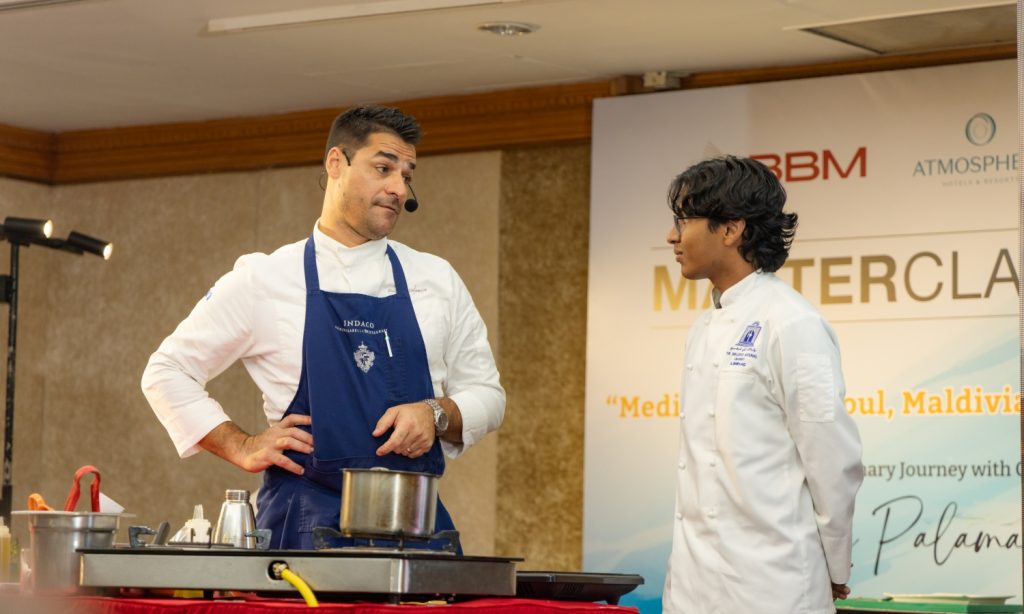
The masterclass follows two immersive days at RAAYA by Atmosphere earlier in the month, where guests joined farm experiences, tasting sessions, and a hands-on workshop before a five-course dinner curated by Chef Pasquale. The series will continue with a 4-Hands Dinner at Kaagé on 27 November and a masterclass with a five-course dinner at NÜ on 28 November at VARU by Atmosphere.
Anupam Banerjee, Vice President, Food & Beverage at Atmosphere Core, emphasised how the collaboration bridges traditions and culinary ideologies.
“All our island resorts have long been recognised for their culinary offerings,” he noted. “Through Chef Pasquale’s artistry and our island-inspired ethos, we are crafting an evocative dialogue between Mediterranean and Maldivian gastronomies that not only captivates the palate but also champions environmental stewardship and celebrates the cultural richness of both regions.”
For attending chefs, the session offered more than demonstrations—it provided the rare opportunity to learn directly from a Michelin-starred figure whose approach blends innovation with a respect for locality. Many participants described the workshop as an opportunity to refine technique, discover new applications for familiar ingredients, and build valuable connections within the professional community.
With strong engagement and enthusiastic feedback from attendees, the masterclass stands as another milestone in BBM’s long-standing role in elevating culinary standards in the Maldives.
Business
2 decades of culinary excellence: BBM’s founding legacy with Hotel Asia continues in 2025
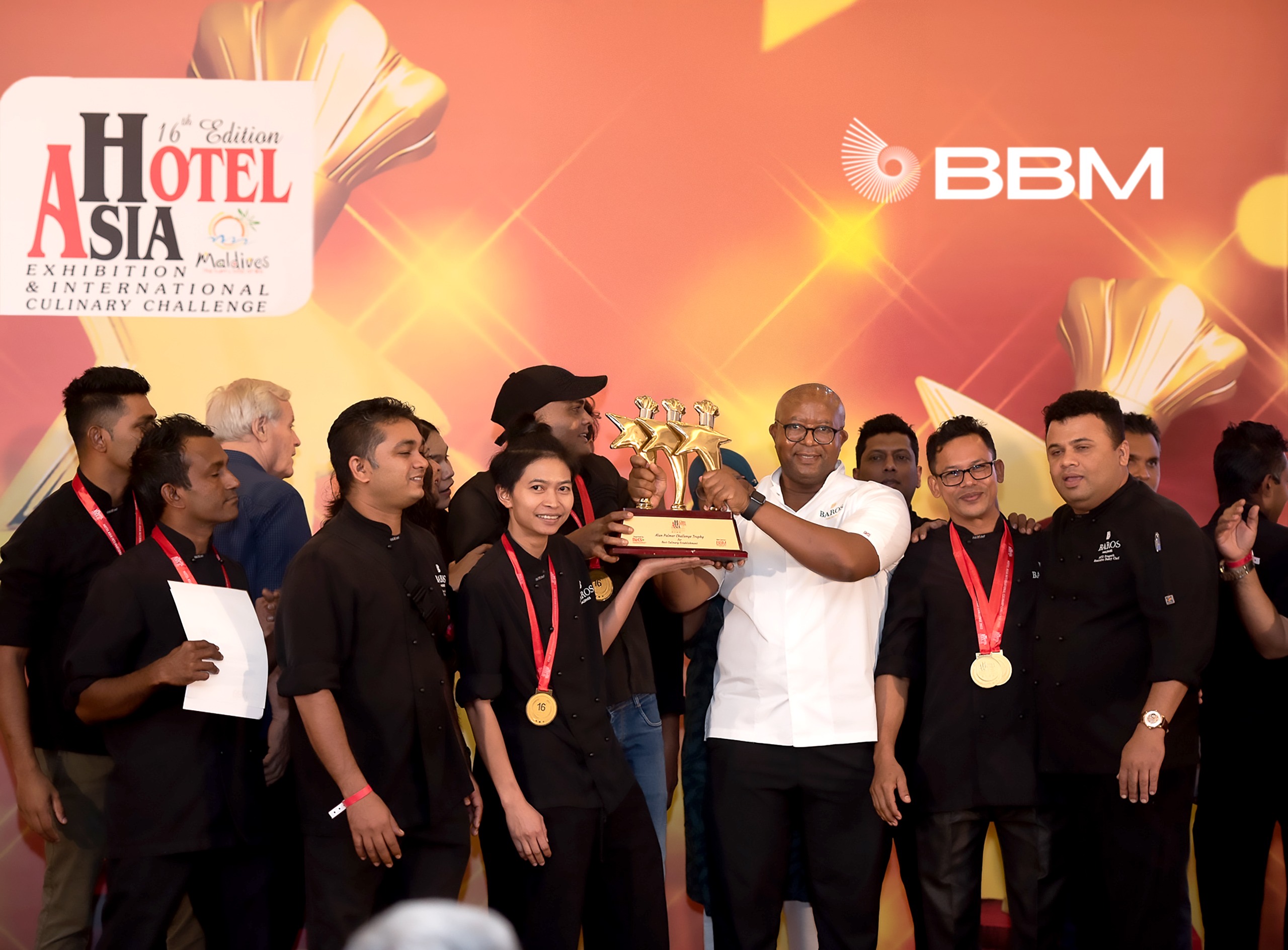
Hotel Asia Exhibition and International Culinary Challenge is referred to be the hospitality industry event in the Maldives. In this year’s Culinary Challenge (19 to 22 October 2025) comprising competitions over 20 categories, most will take place at the Faculty of Hospitality and Tourism Studies, Maldives National University, and some at the Synthetic Track, Hulhumalé.
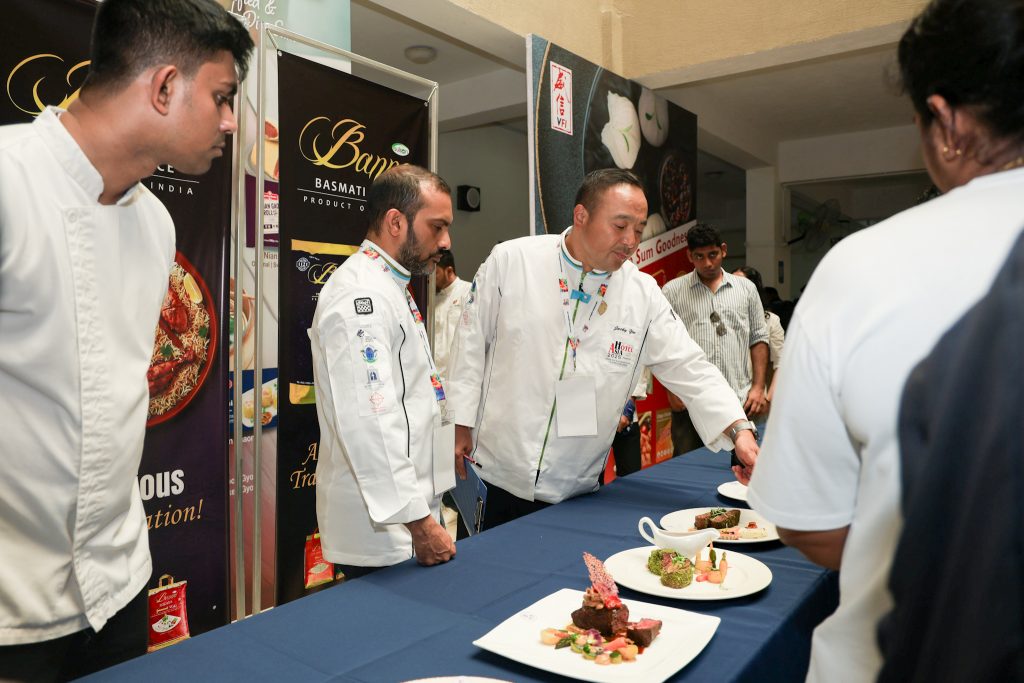
A Founding Partnership that Endures
Since the very first edition in 2001, Bestbuy Maldives (BBM) has played a central role in shaping the International Culinary Challenge into the Maldives’ most prestigious culinary platform. The event has become a cornerstone for professional development, bringing together chefs from across the Maldives to compete, learn, and showcase their craft.
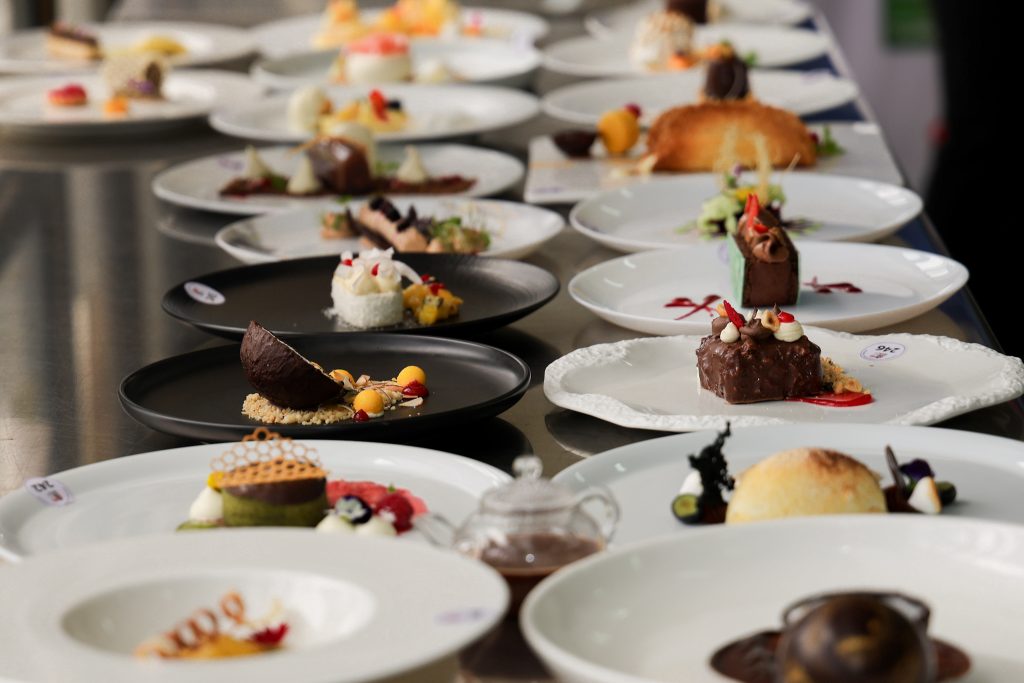
BBM and their associated Principals sponsor an overwhelming majority of categories. “From the beginning, our goal has been to create opportunities for Maldivian chefs to rise to global standards. This partnership has grown with the industry itself,” said A.V.S. Subrahmanyam, Chief Operating Officer of BBM.
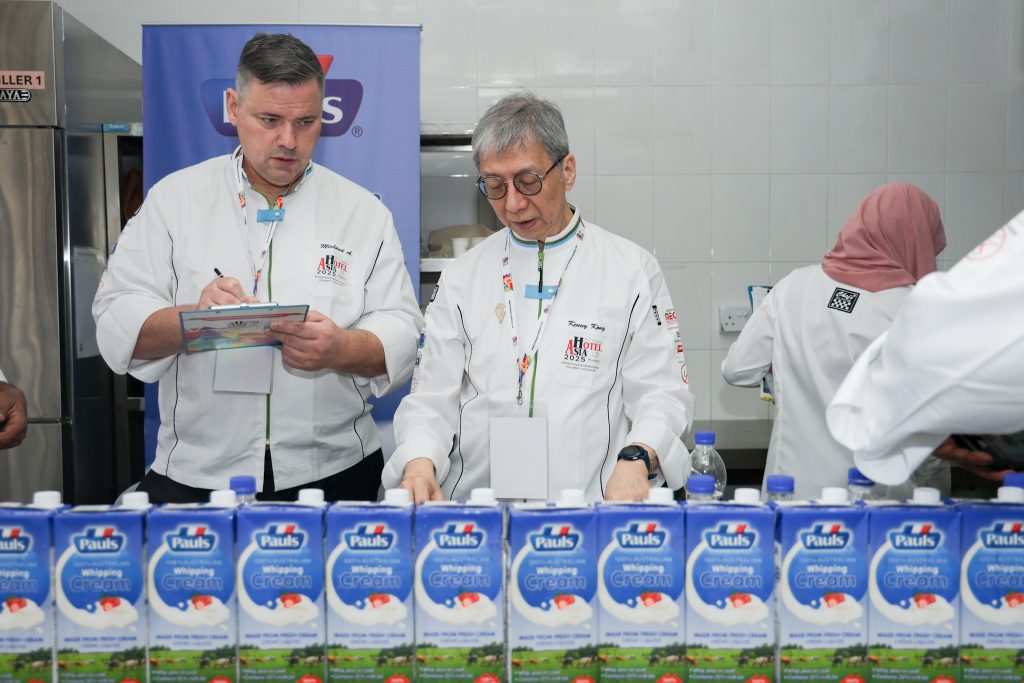
Nurturing Local Talent
BBM’s contribution extends beyond sponsorship. The company has built a long-term system for recognizing and developing local culinary talent.
- BBM Chairman’s Trophy for the Best Maldivian Competitor.
- Most Promising Young Chef Award for emerging talent.
- Global exposure programs for Maldivian chefs through sponsored participation in international events.
- Pro-bono Masterclasses with world-renowned chefs to encourage learning and innovation.
Investing in the Future of Hospitality
Through initiatives such as Building Young Talent, BBM continues to mentor aspiring professionals and support the next generation of chefs. The company also promotes inclusivity by sponsoring opportunities for female and young chefs to gain international exposure.
BBM’s industry partnerships include its role as Title Sponsor of the Hotelier Maldives Awards, celebrating excellence across the Maldivian hospitality sector.
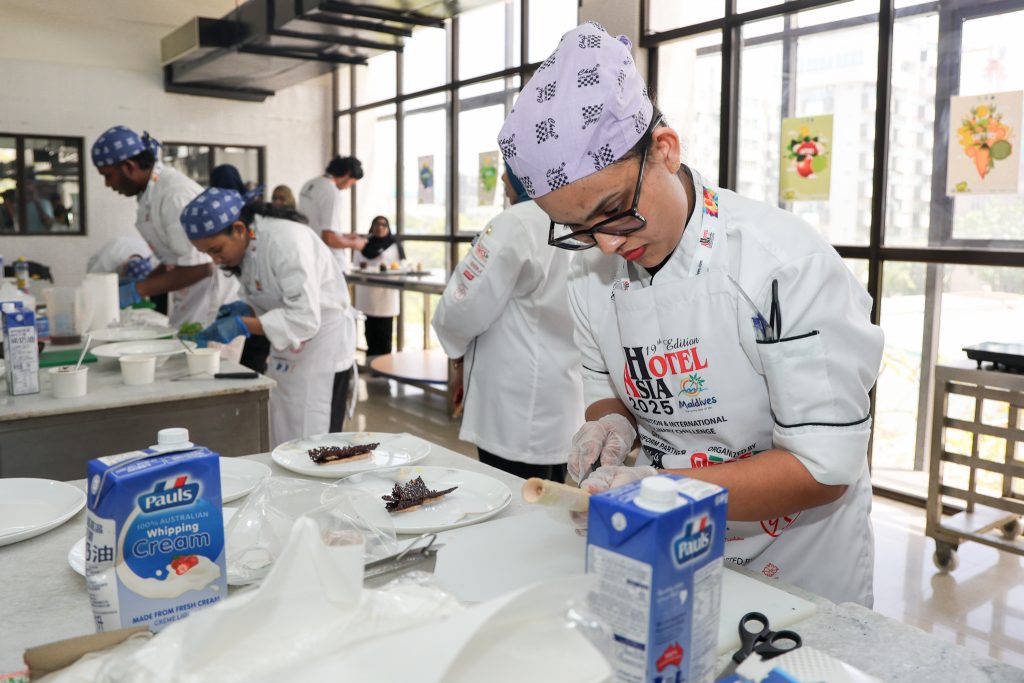
Proud Sponsors of Culinary Excellence
In 2025, BBM and its partner brands proudly sponsor 14 competition categories and 8 Main Awards, further strengthening their role in the development of culinary arts in the Maldives. Categories include Decorated Cake, Artistic Showpiece, Bread and Pastry Display, Three Desserts (Display), Desserts, Rice Dish, Asian Noodles, Team Challenge, Maldivian Dish, Creative Sandwich, Young Chef, Tea Challenge, tapas/finger food, and Iced Mocktail.
-
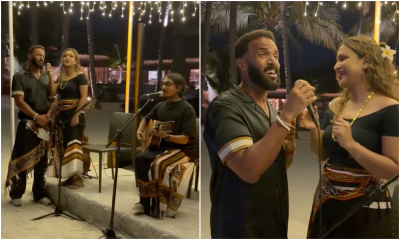
 Entertainment6 days ago
Entertainment6 days agoCraig David shares emotional Maldives moment after ‘Rise & Fall’ surprise at resort dinner
-
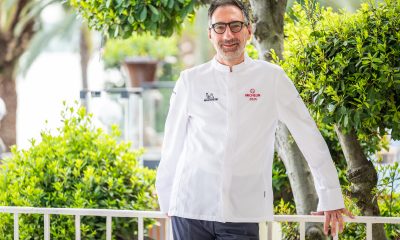
 Food1 week ago
Food1 week agoMichelin-starred Italian chef Maurizio Bufi brings Lake Garda flavours to The Ritz-Carlton Maldives, Fari Islands
-
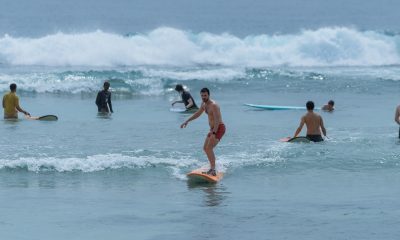
 Action1 week ago
Action1 week agoAtaraxis Grand & Spa hosts integrated work-and-dive corporate retreat in Fuvahmulah
-
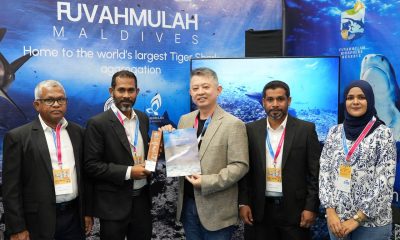
 Awards4 days ago
Awards4 days agoFuvahmulah receives Tiger Shark Dive Award at DRT Expo KL
-
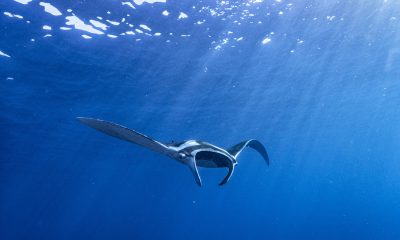
 Action1 week ago
Action1 week agoFour Seasons Landaa Giraavaru shares manta sightings forecast for 2026 and 2027
-
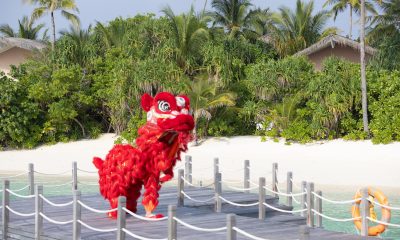
 Love1 week ago
Love1 week agoJW Marriott Maldives Resort & Spa invites couples to a season of romance and refined indulgence
-
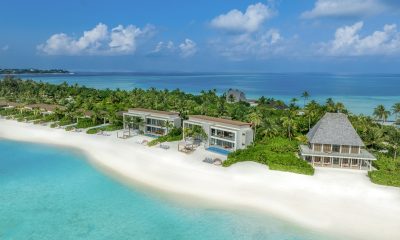
 News1 week ago
News1 week agoKuda Villingili Resort Maldives becomes part of Global Hotel Alliance network
-
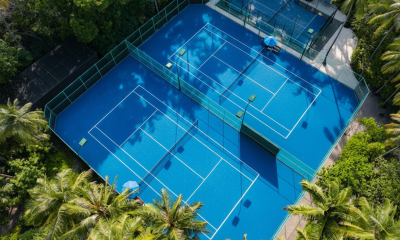
 Action5 days ago
Action5 days agoDusit Thani Maldives adds padel and upgrades sports facilities











